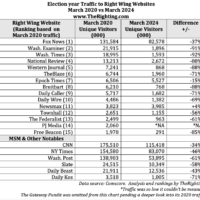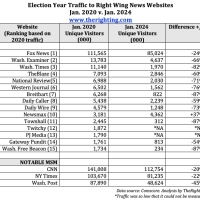
Three publicly traded media companies that hope the election year will inspire MAGA-minded consumers to shift their attention and spending to a right-wing “parallel economy” will have to keep hoping.
Rumble, Public Square, and Salem Media Group all reported last month that their net losses grew in the first quarter of 2024, compared to the same period last year.
That unimpressive start might account for a few of the quirky initiatives and curiously vague disclosures executives also recently made. For example:
–Video platform Rumble began to sell a line of pricey coffee beans. Even with the caffeine jolt, the company promises that customers will be able to “sleep well at night knowing that your hard-earned dollars is (sic) going toward supporting freedom-loving creators on Rumble.”
–Public Square, which generates most of its revenues from a right-to-life supporting diaper subsidiary, expanded into the death business. It acquired a controversial firm that offers buy-now/pay-later financing for gun sales.
–Salem Media was short on details about the lackluster ad sales for its right-wing and Christian radio programming as well as plans it announced a year ago for a 2024 film from conspiracy theorist Dinesh D’Souza.
Losing The Street
Wall Street appears to be tiring of the sector. Over the last 12 months — a period when the benchmark Standard & Poor’s 500 rose 21.8 percent — Rumble shares fell 35.1 percent, Public Square’s down 69.1 percent, and Salem (which no longer trades on one of the major stock exchanges) dropped 71.3 percent.
Here’s how each company fared in early 2024.
When in Doubt, Have a Cup of Coffee
Last year Rumble CEO Chris Pavlovski predicted that the U.S. election cycle would make 2024 “our Super Bowl.” But the Peter Thiel-backed video platform failed to score in the first quarter – due in part to the lack of excitement around the Republican presidential primaries.
“We did see a little pick up (in user engagement) in January with the primaries but that fizzled really fast,” Pavlovski told analysts last month. “We haven’t seen that come back yet.”
Cash also hasn’t come back: Rumble reported an 85 percent increase in its net loss, to $43.3 million, for the first three months of 2024 vs. the same period last year. Revenues grew less than 1 percent to $17.7 million, hurt in part by a $3.1 million decline in ad sales.
But hope springs eternal at Rumble. Pavlovski urged investors to hang in for what he called an “exciting back half of the year.”
Rumble plans to play a prominent role this July at the Republicans’ national convention in Milwaukee and “we’re going to be a big part” of the election season.
What’s more, he says expenses should fall now that Rumble is “officially through our building phase” and “focused on top line growth.”
In 2025 Rumble will “start heading towards break even,” CFO Brandon Alexandroff says. When an analyst asked what that means, the CFO added that “we’re not giving a specific definition of what that is and we’re also not giving guidance at this stage at which quarter in particular” its revenues will exceed outlays.
Pavlovsky says he will cut spending to “incentivize certain prominent creators to join our platform” now that Rumble is active. The deals, which run from 1-to-3 years, should begin to expire later this year.
Executives optimistically predict ad sales will grow from the newly launched Rumble Studio for livestreaming which Pavlovsky says uses “patent pending technology to facilitate host-read advertising through the platform.”
He adds that the company has seen “tremendous early results” from creators who have used it, who include Tucker Carlson, Megyn Kelley, Glenn Greenwald, Dave Rubin, and Donald Trump Jr.
Meanwhile, right-wing outlets including Breitbart, the Gateway Pundit, and The Drudge Report have begun to take advantage of another new initiative: the Rumble Advertising Center (RAC) which inserts pre-roll advertising across the company’s apps.
Rumble is prepared to advertise its own products if major brands remain allergic to a platform that traffics in grievance politics and conspiracy theories. The company just teamed with a right-wing parallel economy company, Stardust Group, to promote 1775 Coffee, which starts at $23.99 a pound or $19.99 for those who subscribe.
“1775 coffee is not only the richest, smoothest, and most outstanding brew you’ll ever taste, but also not a single dollar from your purchase will ever be donated to the woke political agenda,” the company says on its website. “Think about that the next time a blue-haired barista is taking your order.”
Coffee sales have increased so much, Pavlovski says, that “we have decided to launch multiple new products in the coming months” which will entail “nearly zero investment.”
Diapers, Guns, and Money
Public Square CEO Michael Seifert sure loves hyperbole. He describes the MAGA-friendly e-retail startup as the “backbone of the parallel economy’s ecosystem.” And he told Wall Street analysts this month that it had just completed “our most monumental quarter yet.”
Well, perhaps — but it’s tiny monument.
Public Square generated $3.5 million in revenues in the first quarter – about 80 percent as much as advertisers paid for a minute-long break on the Oscars. And 62 percent came from sales of its EveryLife line of and Mexican-made, non-flushable baby wipes and non-biodegradable diapers which it bought last year.
Revenues were up 817 percent vs the same period in 2023, mostly because the diaper sales were not recorded until July. Public Square’s losses in this year’s first quarter increased 88 percent to $12.6 million.
Some of the increase in Public Square’s net loss was due to the deal in March for gun financing company Credova Holdings. The e-retailer paid $15.7 million in stock and cash, and assumed $8.4 million in debt. As part of the deal, Credova’s controversial CEO Dusty Wunderlich joined Public Square’s board.
The deal “underscores the lasting power and potential of the parallel economy” that “upholds our values and protects our community.” Wunderlich said.
The deal comes two years after 18 Democratic members of Congress said in a letter to Wunderlich that they were “concerned that the ease with which buyers can acquire guns through (buy-now, pay-later) will result in more guns and increased gun violence in our nation’s communities.”
They added that buy-now/pay-later companies “have access to consumers’ purchase history and financial data, and it is unclear how that data is protected or exploited.”
In his website, Wunderlich describes himself as a libertarian and cryptocurrency advocate whose “personal ethical system is rooted in Christian principles and values as expressed through scripture and the leadership of my personal Church.”
Radio Static and Dead Air on Financial Details
Salem Media is throwing the luggage out of the lifeboats as its high-octane right-wing programs from commentators including Hugh Hewitt, Mike Gallagher, Dennis Prager, Sebastian Gorka, and Charlie Kirk fail to provide the financial oomph it needs.
Faced with $168.6 million in debt and declines in its core radio business, Salem recently sold or agreed to sell radio properties in Greenville, SC, Nashville, and Honolulu — as well as its corporate headquarters in Camarillo, CA, which it will lease back for five years. In December it sold one of its more prominent assets — the right-wing Regnery book publishing business — for $3 million.
Even so, Salem’s net loss was up slightly to $5.2 million in the first quarter as revenues fell 7.7 percent to $58.6 million. Radio broadcasting, which accounts for 79 percent of the revenues, fell 4.6 percent — and 3.2 percent at the stations Salem still owns.
The company sold only $900,000 worth of political ads on radio in the first quarter.
Salem hoped that its digital media properties — including Townhall, Hot Air, RedState, and commentator podcasts — would grow fast enough to compensate for the declines in radio. But revenues only rose 1.9 percent due in part, it says, to “Facebook algorithms that limit political content.”
The company also had high hopes for its investments in movies. It profited handsomely from 2000 Mules,director Dinesh D’Souza’s roundly debunked effort to demonstrate widespread voter fraud in the 2020 presidential election.
But last week Salem apologized for the film and a book based on it, and promised to remove them from its platforms and engage in “no future distribution.”
Why was it canceled? Apparently to settle a lawsuit: Salem acknowledged that the film falsely claimed that a Georgia man, Mark Andrews, had criminally served as a “mule” who stuffed ballot boxes with “fraudulent votes.” The Georgia Bureau of Investigations and the Georgia Election Board cleared him in May 2022, and he sued Salem and D’Souza for defamation in October, noting that he and his family had been subject to threats of violence.
Salem said it “relied on representations made to us” by D’Souza” and it was “never our intent” that the movie, book, and promotional material it distributed would harm Andrews and his family.
That might explain why Salem offered no update about the $1.5 million ownership investment it trumpeted last year for another D’Souza film that it said it would release in 2024. Salem continues to distribute the Dinesh D’Souza Podcast.
Also missing from Salem’s first quarter report were specifics about how last year’s ballyhooed $30 million agreement to sell its Church Products operation to tech company Gloo fell apart. Salem said in March that this was due to the buyer’s inability to “secure the necessary financing.”
























